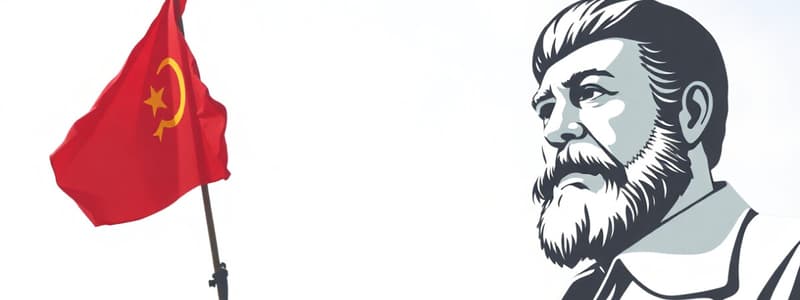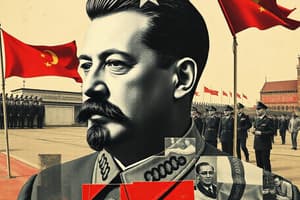Podcast
Questions and Answers
According to Marx and Engels, why is the transition between modes of production not peaceful?
According to Marx and Engels, why is the transition between modes of production not peaceful?
Each mode of production has a dominant class that must be overthrown before the transition to the next mode can be completed.
What class did the French Revolution primarily benefit, according to Marx and Engels?
What class did the French Revolution primarily benefit, according to Marx and Engels?
The bourgeoisie, comprising professionals and businessmen.
What is the role of revolution in historical transitions, according to Marx and Engels?
What is the role of revolution in historical transitions, according to Marx and Engels?
Revolution is a necessary agent of change.
What is one limitation of capitalism, even though it is progressive?
What is one limitation of capitalism, even though it is progressive?
What earlier revolution does the text mention served as precedent for the kind of change they were hoping for?
What earlier revolution does the text mention served as precedent for the kind of change they were hoping for?
How did Marx and Engels view European history from the middle ages onward?
How did Marx and Engels view European history from the middle ages onward?
What is the ultimate goal of socialist revolutions, according to the text?
What is the ultimate goal of socialist revolutions, according to the text?
What are the three tenets of revolution, according to this article?
What are the three tenets of revolution, according to this article?
What historical event predominantly influenced early studies of revolution during the 19th and early 20th centuries?
What historical event predominantly influenced early studies of revolution during the 19th and early 20th centuries?
According to the image provided, who are the authors of the Manifesto of the Communist Party?
According to the image provided, who are the authors of the Manifesto of the Communist Party?
How might studying historical revolutions, such as the French Revolution, inform our understanding of contemporary political movements and social change?
How might studying historical revolutions, such as the French Revolution, inform our understanding of contemporary political movements and social change?
If you are observing a modern political movement, what are two key aspects, inspired by historic revolutions, that you should consider when assessing its potential for success or failure?
If you are observing a modern political movement, what are two key aspects, inspired by historic revolutions, that you should consider when assessing its potential for success or failure?
Explain how the ideas presented in The Communist Manifesto might relate to the causes or outcomes of historical revolutions.
Explain how the ideas presented in The Communist Manifesto might relate to the causes or outcomes of historical revolutions.
Describe how studying the authorship and context of The Communist Manifesto can impact our understanding of its arguments and influence.
Describe how studying the authorship and context of The Communist Manifesto can impact our understanding of its arguments and influence.
What replaces the old local and national seclusion and self-sufficiency?
What replaces the old local and national seclusion and self-sufficiency?
Besides class struggle, what other societal factors might contribute to revolutionary movements?
Besides class struggle, what other societal factors might contribute to revolutionary movements?
How does the text describe the impact of new industries on old, established national industries?
How does the text describe the impact of new industries on old, established national industries?
How could analyzing primary source documents, such as The Communist Manifesto, contribute to a deeper understanding of historical events?
How could analyzing primary source documents, such as The Communist Manifesto, contribute to a deeper understanding of historical events?
How does the text portray the relationship between national and intellectual production?
How does the text portray the relationship between national and intellectual production?
What drives the need for products from distant lands and climes?
What drives the need for products from distant lands and climes?
What is happening to national one-sidedness and narrow-mindedness?
What is happening to national one-sidedness and narrow-mindedness?
Describe a key change in raw material usage brought about by new industries, as discussed in the text.
Describe a key change in raw material usage brought about by new industries, as discussed in the text.
How does the text characterize the relationship between civilized nations and the introduction of new industries?
How does the text characterize the relationship between civilized nations and the introduction of new industries?
How does the text describe the consumption of products manufactured by new industries?
How does the text describe the consumption of products manufactured by new industries?
What are the effects of the bourgeoisie's actions regarding production and property?
What are the effects of the bourgeoisie's actions regarding production and property?
What pre-existing condition led to the bourgeoisie's actions, as described in the text?
What pre-existing condition led to the bourgeoisie's actions, as described in the text?
Inferring from the text, how might the concentration of property in a few hands impact the interests of the wider population?
Inferring from the text, how might the concentration of property in a few hands impact the interests of the wider population?
What is the relationship between centralization of the means of production and the state of property, according to the text?
What is the relationship between centralization of the means of production and the state of property, according to the text?
Based on the text, what broader societal change is indicated by unifying scattered populations, means of production, and property?
Based on the text, what broader societal change is indicated by unifying scattered populations, means of production, and property?
In the context of the text, what does the phrase 'all that is solid melts into air' signify about the nature of society and its established norms?
In the context of the text, what does the phrase 'all that is solid melts into air' signify about the nature of society and its established norms?
How does the text suggest that the bourgeoisie's need for a constantly expanding market influences global interactions and relationships?
How does the text suggest that the bourgeoisie's need for a constantly expanding market influences global interactions and relationships?
Explain how the bourgeoisie's exploitation of the world-market contributes to the 'cosmopolitan character' of production and consumption?
Explain how the bourgeoisie's exploitation of the world-market contributes to the 'cosmopolitan character' of production and consumption?
What is implied by the phrase 'man is at last compelled to face with sober senses his real conditions of life'?
What is implied by the phrase 'man is at last compelled to face with sober senses his real conditions of life'?
How does the text portray the relationship between newly formed ideas and established traditions in this era of societal change?
How does the text portray the relationship between newly formed ideas and established traditions in this era of societal change?
In this context, what does the term 'Reactionists' refer to and why do they feel 'chagrin'?
In this context, what does the term 'Reactionists' refer to and why do they feel 'chagrin'?
How might the constant disruption and change described in the text affect an individual's sense of identity and belonging?
How might the constant disruption and change described in the text affect an individual's sense of identity and belonging?
How can this text be used to explain globalization?
How can this text be used to explain globalization?
According to Marx and Engels, what are the two possible outcomes of the class struggle throughout history?
According to Marx and Engels, what are the two possible outcomes of the class struggle throughout history?
How did the discovery of America and the opening of new markets affect the development of the bourgeoisie?
How did the discovery of America and the opening of new markets affect the development of the bourgeoisie?
What is the 'distinctive feature' of the bourgeois epoch regarding class antagonisms, according to Marx and Engels?
What is the 'distinctive feature' of the bourgeois epoch regarding class antagonisms, according to Marx and Engels?
Before the manufacturing system, what system monopolized industrial production, and why did it become insufficient?
Before the manufacturing system, what system monopolized industrial production, and why did it become insufficient?
Explain the progression, according to the text, from serfs to the bourgeoisie.
Explain the progression, according to the text, from serfs to the bourgeoisie.
In the context of class struggle, briefly describe the relationship between 'oppressor' and 'oppressed' as presented by Marx and Engels.
In the context of class struggle, briefly describe the relationship between 'oppressor' and 'oppressed' as presented by Marx and Engels.
How did advancements in trade, navigation and industry impact the 'tottering feudal society'?
How did advancements in trade, navigation and industry impact the 'tottering feudal society'?
Identify at least three distinct social classes or ranks, other than Bourgeoisie and Proletariat, present in the 'earlier epochs of history' as mentioned in the text.
Identify at least three distinct social classes or ranks, other than Bourgeoisie and Proletariat, present in the 'earlier epochs of history' as mentioned in the text.





